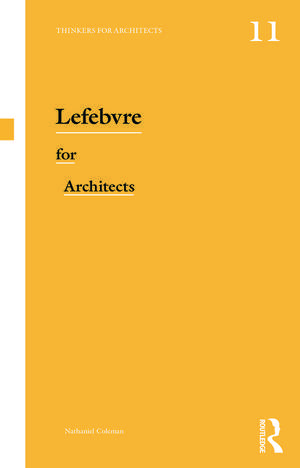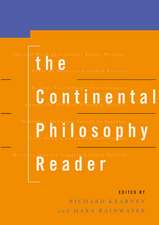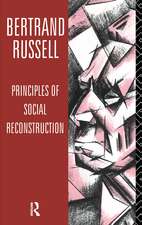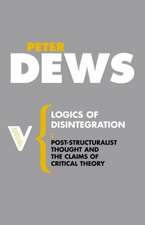Lefebvre for Architects: Thinkers for Architects
Autor Nathaniel Colemanen Limba Engleză Paperback – 23 dec 2014
Contemporary discomfort with romanticism and Utopia arguably obstructs the shift of Lefebvre’s thinking from being objects of theoretical interest into positions of actually influencing practices. Attempting to understand and act upon architecture and the city with Lefebvre but without Utopia and romanticism risks muting the impact of his ideas. Although Utopia may seem to have no place in the present, Lefebvre reveals this as little more than a self-serving affirmation that ‘there is no alternative’ to social and political detachment. Demanding the impossible may end in failure but as Lefebvre shows us, doing so is the first step towards other possibilities. To think with Lefebvre is to think about Utopia, doing so makes contact with what is most enduring about his project for the city and its inhabitants, and with what is most radical about it as well.
Lefebvre for Architects offers a concise account of the relevance of Henri Lefebvre’s writing for the theory and practice of architecture, planning and urban design. This book is accessible for students and practitioners who wish to fully engage with the design possibilities offered by Lefebvre’s philosophy.
| Toate formatele și edițiile | Preț | Express |
|---|---|---|
| Paperback (1) | 223.98 lei 6-8 săpt. | |
| Taylor & Francis – 23 dec 2014 | 223.98 lei 6-8 săpt. | |
| Hardback (1) | 995.54 lei 6-8 săpt. | |
| Taylor & Francis – 7 ian 2015 | 995.54 lei 6-8 săpt. |
Din seria Thinkers for Architects
-
 Preț: 198.09 lei
Preț: 198.09 lei -
 Preț: 213.01 lei
Preț: 213.01 lei - 5%
 Preț: 166.65 lei
Preț: 166.65 lei -
 Preț: 201.37 lei
Preț: 201.37 lei -
 Preț: 175.29 lei
Preț: 175.29 lei -
 Preț: 233.40 lei
Preț: 233.40 lei -
 Preț: 230.82 lei
Preț: 230.82 lei -
 Preț: 234.39 lei
Preț: 234.39 lei -
 Preț: 275.15 lei
Preț: 275.15 lei -
 Preț: 288.61 lei
Preț: 288.61 lei -
 Preț: 270.67 lei
Preț: 270.67 lei -
 Preț: 269.05 lei
Preț: 269.05 lei -
 Preț: 260.61 lei
Preț: 260.61 lei -
 Preț: 256.04 lei
Preț: 256.04 lei -
 Preț: 299.65 lei
Preț: 299.65 lei -
 Preț: 235.75 lei
Preț: 235.75 lei -
 Preț: 236.34 lei
Preț: 236.34 lei -
 Preț: 174.58 lei
Preț: 174.58 lei
Preț: 223.98 lei
Nou
Puncte Express: 336
Preț estimativ în valută:
42.86€ • 45.83$ • 35.73£
42.86€ • 45.83$ • 35.73£
Carte tipărită la comandă
Livrare economică 17 aprilie-01 mai
Preluare comenzi: 021 569.72.76
Specificații
ISBN-13: 9780415639408
ISBN-10: 0415639409
Pagini: 172
Ilustrații: 15 black & white halftones
Dimensiuni: 138 x 216 x 15 mm
Greutate: 0.52 kg
Ediția:1
Editura: Taylor & Francis
Colecția Routledge
Seria Thinkers for Architects
Locul publicării:Oxford, United Kingdom
ISBN-10: 0415639409
Pagini: 172
Ilustrații: 15 black & white halftones
Dimensiuni: 138 x 216 x 15 mm
Greutate: 0.52 kg
Ediția:1
Editura: Taylor & Francis
Colecția Routledge
Seria Thinkers for Architects
Locul publicării:Oxford, United Kingdom
Public țintă
Postgraduate and UndergraduateCuprins
1. Introduction: Lefebvre for Architects Lefebvre for Architects The Problematic of Architecture Lefebvre and Architecture Architecture Thinking Its Own Thoughts 2. Utopia and a New Romanticism Utopia as the Prospect of the Possible Romanticism & Utopia Generate & Degenerate Utopias Critiques of Everyday Life There is no alternative? Or, Lefebvre and Utopia Lefebvre’s Other Vision of Utopia Dialectical Utopianism Experimental and Theoretical Utopias The Utopian Prospect of Lefebvre 3. The Production of Space Problematic of The Production of Space From Space to Place Overcoming Cartesian Logic Representations of the Relations of Production Recuperating the Social Repetition Everywhere Spatial Codes Spatial Practice / Representations of Space / Representational Space The Antithesis of Systems 4. Rhythmanalysis and the TimeSpace of the City Counterpractices for Today Elements of Rhythmanalysis Phenomenology from Your Window? The Perils of Capital The Rhythmanalyst and the Architect 5. Conclusion: Another Scale? Further Reading Bibliography Index
Notă biografică
Nathaniel Coleman is Reader in History and Theory of Architecture at Newcastle University, UK. He previously taught in the US, and practiced architecture in New York, USA, and Rome, Italy. Author of Utopias and Architecture (2005) and editor of Imagining and Making the World: Reconsidering architecture and Utopia (2011), Nathaniel recently guest-edited a special issue on architecture of the journal Utopian Studies (2014). He has published numerous journal articles and book chapters, and presented his research on the problem of architecture and Utopia internationally. He is particularly interested in the convergences of architectural history, theory and design with Utopia’s generative potential.
Recenzii
'Henri Lefebvre is one of the most important and influential theorists of spatiality in our time: his work has been formative in many scholarly fields and in the ongoing project of progressive political change. Nathaniel Coleman, one of the leading contemporary scholars of architectural theory, does us all a tremendous service in bringing this study of Lefebvre into architectural discourse.' - Tom Moylan, Glucksman Professor Emeritus, School of Culture and Communication; Founding Director, Ralahine Centre for Utopian Studies; Adjunct Professor, School of Architecture; University of Limerick
'The almost tangible reality of space articulated through the rhythms of daily life and the enduring worth of much-maligned utopian thinking for the architect are two themes of Lefebvre’s which Coleman has brilliantly brought to our attention.' - Joseph Rykwert, Paul Philippe Cret Professor Emeritus of Architecture and Professor of Art History, University of Pennsylvania, USA
'Lefebvre for Architects, written with verve and precision, serves as a fine introduction to Lefebvre's reflections on the city, space and everyday life. But it goes much further, challenging depoliticized readings of Lefebvre and a mainstream architectural practice dedicated to dreary functionality and neoliberal profit-making, thereby robbing urban spaces of vitality, richness and human possibility. Emphasizing Lefebvre's 'concrete utopianism', a specific method of sociocultural inquiry aligned with experimental practice, Coleman boldly invites us to be realistic, by demanding the impossible.' - Michael E. Gardiner, Professor of Sociology at The University of Western Ontario, Canada
'Nathaniel Coleman is a distinctive voice on architecture and Utopia. This excellent, clearly-written and accessible book on Lefebvre will be an important resource not just for the architects at whom it is principally directed. It brings social theory onto the streets, and will be invaluable for those working in utopian studies, sociology, geography and planning alike – and indeed anyone who is concerned with the interface of the built environment and social processes, both as they are and how they might be.' - Ruth Levitas, Emerita Professor of Sociology, University of Bristol, UK
'Nathaniel Coleman’s firm, fluent style will help readers navigate the complexities of Lefebvre’s thought with confidence. Rather than pulling Lefebvre’s densely layered mode of working apart into easily digested, bulleted rules, he shows, rather than tells, how Lefebvre thinks like an architect, working through scenarios and going back to the drawing board again and again.' - Tim Waterman, Senior Lecturer in Landscape Architecture, Writtle School of Design
'Coleman admirably demonstrates the contemporary relevance of Lefebvre’s writing not only for practising architects, but also for anyone who is interested in critical thinking and socially engaged action. An important aspect of Lefebvre for Architects is the convincing affirmation of utopianism as an essential material for any alternative to corporate capitalism and commodity « culture ». As such it is essential reading for all those involved in building the future.' - Diane Morgan, School of Fine Art, History of Art & Cultural Studies, University of Leeds
'The almost tangible reality of space articulated through the rhythms of daily life and the enduring worth of much-maligned utopian thinking for the architect are two themes of Lefebvre’s which Coleman has brilliantly brought to our attention.' - Joseph Rykwert, Paul Philippe Cret Professor Emeritus of Architecture and Professor of Art History, University of Pennsylvania, USA
'Lefebvre for Architects, written with verve and precision, serves as a fine introduction to Lefebvre's reflections on the city, space and everyday life. But it goes much further, challenging depoliticized readings of Lefebvre and a mainstream architectural practice dedicated to dreary functionality and neoliberal profit-making, thereby robbing urban spaces of vitality, richness and human possibility. Emphasizing Lefebvre's 'concrete utopianism', a specific method of sociocultural inquiry aligned with experimental practice, Coleman boldly invites us to be realistic, by demanding the impossible.' - Michael E. Gardiner, Professor of Sociology at The University of Western Ontario, Canada
'Nathaniel Coleman is a distinctive voice on architecture and Utopia. This excellent, clearly-written and accessible book on Lefebvre will be an important resource not just for the architects at whom it is principally directed. It brings social theory onto the streets, and will be invaluable for those working in utopian studies, sociology, geography and planning alike – and indeed anyone who is concerned with the interface of the built environment and social processes, both as they are and how they might be.' - Ruth Levitas, Emerita Professor of Sociology, University of Bristol, UK
'Nathaniel Coleman’s firm, fluent style will help readers navigate the complexities of Lefebvre’s thought with confidence. Rather than pulling Lefebvre’s densely layered mode of working apart into easily digested, bulleted rules, he shows, rather than tells, how Lefebvre thinks like an architect, working through scenarios and going back to the drawing board again and again.' - Tim Waterman, Senior Lecturer in Landscape Architecture, Writtle School of Design
'Coleman admirably demonstrates the contemporary relevance of Lefebvre’s writing not only for practising architects, but also for anyone who is interested in critical thinking and socially engaged action. An important aspect of Lefebvre for Architects is the convincing affirmation of utopianism as an essential material for any alternative to corporate capitalism and commodity « culture ». As such it is essential reading for all those involved in building the future.' - Diane Morgan, School of Fine Art, History of Art & Cultural Studies, University of Leeds
Descriere
A concise account of the relevance of Henri Lefebvre’s writing for the theory and practice of architecture, planning and urban design. Here is an introduction accessible for students and practitioners who wish to engage with the design possibilities offered by Lefebvre’s philosophy.

















